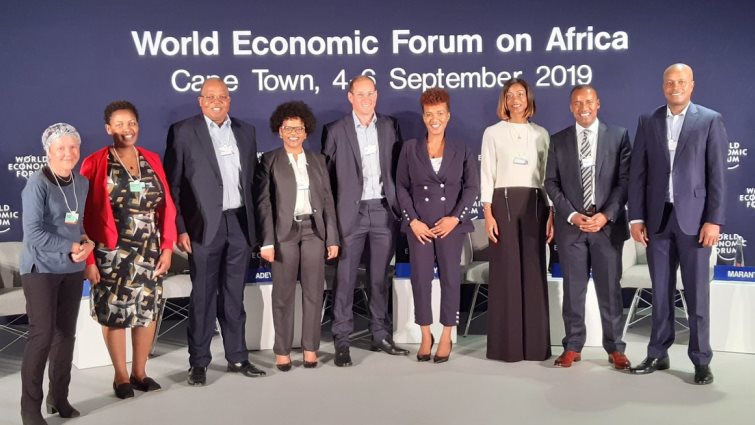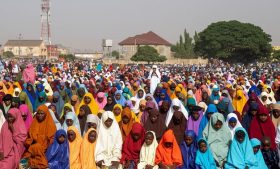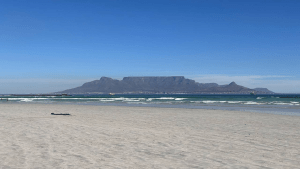Africa has a recipe for sustainable growth, following this year’s agreement on a ground-breaking trade deal that promises to soften borders across the continent, the Co-Chairs of the World Economic Forum on Africa told participants in the closing session today.
While big challenges remain to translate the promise of the Africa Continental Free Trade Area (AfCFTA) into jobs and economic growth on the ground, there is a palpable sense of hope that the components for success are now in place.
“I like to think of this CFTA as the most delicious African dish that can be produced,” said Arancha Gonzalez Laya, Executive Director of the International Trade Centre. “The ingredients have been assembled, the cooks are in the kitchen. The guests are impatiently waiting for this dish to be served.”
The “dish” is vital for the 200 million young Africans aged 15-24 who need to see the continent move up a gear to a higher level of economic growth if they are to secure jobs and contribute to their countries’ prosperity as the workers of the future.
Sipho Pityana, Chairman of AngloGold Ashanti, said the free trade deal is a “catalyst”. However, it is now up to political and business leaders to implement the removal of trade barriers and ensure sufficient investment in infrastructure and logistics to truly accelerate cross-border trade flows.
“We need to soften our borders to enable easy movement,” Pityana said. “We need leadership that is capable and has the determination to act collaboratively.”
For investors, this is a critical moment – and also a testing time for the claim made by South African President Cyril Ramaphosa at the meeting that this will be “Africa’s century”.
“From a business point of view, I view Africa as a large-scale start-up, just as East Asia was in the early 1990s,” said Alex Liu, Managing Partner and Chairman of A.T. Kearney. He argued that the continent could leapfrog ahead in certain areas, just as it has already done in mobile payments.
Including the whole of society will be crucial to delivering sustainable success, given the rapid pace of change in the workplace and the disruptive effects of new technologies with the arrival of the Fourth Industrial Revolution. Africa’s left-behind youth and discriminated-against women have already made clear they are not prepared to tolerate the status quo.
“If we don’t bring society with us then we will end up with similar tensions that the first and the second and the third industrial revolutions had,” Farrar said.
That also requires long-term thinking and a multistakeholder approach from business. Ellen Agler, Chief Executive Officer of the END Fund, a philanthropic initiative tackling neglected tropical diseases, said it is clear that successful companies have to chase more than profit.
“It’s amazing how many times I engage with the pharma sector and they say: ‘We keep the best people because of our programmes on engaging in neglected diseases’ – but that’s one of the things that helps with retention, helps with talent acquisition.”
André Hoffmann, Vice-Chairman of Roche, said Africa’s extraordinary natural heritage also needs to be cherished and is an opportunity for development. “Nature is not something that stops you from developing but it is an opportunity. In fact it is a $1 trillion opportunity for investment,” he said.
Meeting outcomes
Reflecting on the challenges and opportunities of the region, the meeting produced numerous notable outcomes:
- An action plan was launched to tackle the crisis of gender-based violence. The plan is initiated by African Monitor working with multiple stakeholders and backed by the government of South Africa through the Minister of Women, Youth and Persons with Disabilities and UN WOMEN in South Africa. The plan has three core priorities:
- To work with the technology industry to deploy a free emergency response system for women under attack in nine provinces in South Africa
- Support for women entrepreneurs as a means of promoting economic empowerment
- Establishment of a fund to help support South Africa’s gender-based violence strategy and action plan
- An action plan was launched to tackle the crisis of gender-based violence. The plan is backed by the Government of South Africa through the Minister of Women, Youth and Persons with Disabilities and the United Nations in South Africa. The plan has three core priorities:
-
- To work with the technology industry to deploy a free emergency response system for women under attack in nine provinces in South Africa
- Support for women entrepreneurs as a means of promoting economic empowerment
- Establishment of a fund to help support South Africa’s gender-based violence strategy and action plan
- The Africa Growth Platform was launched to help start-up businesses access finance, advice and better regulatory conditions. Founding partners are Alibaba Group, A.T. Kearney, Dalberg Group, Export Trading Group, US African Development Foundation and Zenith Bank.
- The African Risk Resilience Platform was initiated. It will combine private-sector resources with those of governments to help countries prepare for climate- and disease-related disasters.
- The World Economic Forum teamed with the International Trade Centre to kick off an E-Commerce Action Agenda. The initiative is aimed at promoting cross-border data services in Africa, an industry that could create 3 million jobs across the region by 2025.
- The African Union, in partnership with the World Economic Forum, launched a new foundation paving the way for the private sector to help build capacity and resources to strengthen health security across the continent.
- The World Bank and the Forum teamed up with African governments to launch an innovation challenge aimed at finding new ways of using drones across Africa. The competition, supported by the United Kingdom’s Department for International Development, is a precursor to the Africa Drone Forum, which will be held for the first time in 2020 in Rwanda.
- The Forum’s Global Plastic Action Partnership signed a national partnership with the country of Ghana. The partnership aims to combine public- and private-sector resources to tackle plastic pollution and unmanaged waste. The partnership is the first signed with an African country, following an initial partnership signed with Indonesia earlier this year.
- Five private sector partners announced $23 million in new pledges for the Global Fund’s Sixth Replenishment. Donors include Goodbye Malaria, Project Last Mile, GBCHealth, Zenysis Technologies and Africa Health Business.
The 2019 World Economic Forum on Africa takes place 4-6 September in Cape Town, South Africa, under the theme Shaping Inclusive Growth and Shared Futures in the Fourth Industrial Revolution. The meeting will convene more than 1,000 regional and global leaders from government, business, civil society and academia. This gathering will explore new models to help Africa achieve success at a time when technology is creating dramatic economic and societal shifts. The meeting’s highly interactive programme will also cover issues as diverse as skills and education, the ocean economy, the economic impact of drones, free trade and e-commerce.






